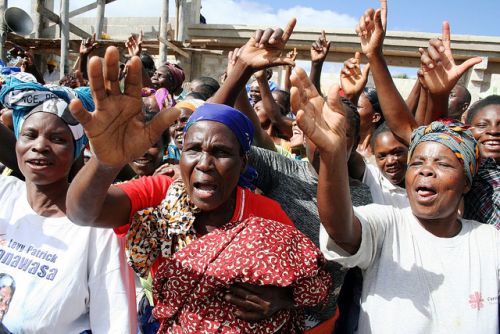Source: IPS Gender Wire For a long time, Zambian women's participation in politics has ended at voting. Credit:Richard Mulonga/IPS |
UNITED NATIONS, Mar 1, 2012 (IPS) - The right of women to participate in political life is guaranteed by several international conventions, but transforming an abstract right into a reality requires hard work on the ground, says a new study released here.
Published jointly by the U.N. Development Programme (UNDP) and the National Democratic Institute (NDI) for International Affairs, the 118-page report points out that although 40 to 50 percent of members of political parties globally are women, only about 10 percent hold positions of leadership.
And "with less than 20 percent of the world's parliamentary seats occupied by women," says UNDP Administrator Helen Clark, "it is clear that political parties need to do more - and should be assisted in those efforts - to support women's political empowerment."
Titled "Empowering Women for Stronger Political Parties", the study aims to provide a good practices guide to promote women's political participation, and includes 20 case studies covering countries such as Burkina Faso, El Salvador, Indonesia, Morocco, Spain, Timor-Leste, UK and the United States.
"If we want to promote democracy and empower women politically, we must engage, not bypass, political parties," UNDP Gender Team Director Winnie Byanyima told IPS.
Unless women lead political parties, they will not lead governments, said Byanyima, a former Ugandan parliamentarian and diplomat.
Globally, the proportion of women ministers in governments is lower, averaging about 16 percent. And the proportion of women heads of state and government is lower still, and has declined in recent years, standing at less than five percent in 2011.
"The low numbers continue in the face of three decades of lobbying and efforts by the international community to eliminate discrimination and empower women," the study notes.
And this despite the fact the United Nations recognised the central role of women in development by including the empowerment of women as one of the eight Millennium Development Goals (MDGs) back in 2000.
"Yet no region in the world is on track to achieve the target of 30 percent women in decision-making positions," the study says.
Although some notable exceptions and good practices in this area are discernible, several bottlenecks remain to women's full and equal participation as contestants, the study asserts.
According to the latest statistics released by the Inter- Parliamentary Union (IPU) and U.N. Women Thursday, the number of women as heads of state or government stands at 18 out of 193 countries.
The UNDP/NDI guidebook singles out some of the strategies to be followed during elections, such as training and mentoring women candidates and ensuring women's visibility in campaigns.
The NDI says it has worked with more than 720 political parties and organisations in over 80 countries to create more open political environments in which men and women can actively participate in the democratic process.
"We hope this guide will contribute to this effort," says NDI President Ken Wollack.
In the pre-election phase, recruiting and nominating candidates is probably the most crucial process for ensuring that women participate in politics. But the gender gap widens significantly as candidates for political office move from being eligible to becoming aspirants, to finally being nominated by the party, the study points out.
"It is important for parties to incorporate rules that guarantee women's representation," it says.
When this commitment is unwritten and informal, "it is much more difficult to devise strategies for women to break into the inner circle of power, and harder to hold the party accountable when the commitment is not realized."
And if a party's internal organisation is weak and the rules for recruitment are not clear, "decisions tend to be made by a limited number of elites, usually men."
As examples of affirmative action, the study cites several examples.
One political party in Canada has a candidate recruitment committee to ensure diversity in candidate selection. In Costa Rica, one of the political parties alternates men and women candidates on electoral lists.
In El Salvador, a multi-sectoral association offers training in communications and organising skills that help women become more effective in their political work both inside and outside of parliament.
In South Africa, women party members pushed for changes to the parliamentary calendar to accommodate parliamentarians with families, and also pushed for debates to finish earlier in the evening to accommodate parliamentarians with families, and for childcare facilities to be put in place.
In India, the national executive committee of the Bhatariya Janata Party (BJP) amended its constitution in 2008 to reserve 33 percent of the party's leadership positions for women and make the chief of the national women's branch a member of the party's central election committee.
In Germany, the Christian Democratic Union (CDU) adopted a 33 percent quota for party officials in 1996. And if the quota is not met, the internal elections must be repeated.
